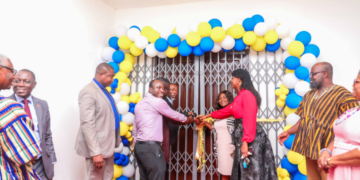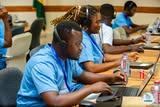The Coalition of Domestic Election Observers (CODEO) has released a preliminary report on the 2024 elections noting several incidents at polling stations.
The report dubbed Polling Day Observation: Mid-Day Situational Report confirmed incidents including vote buying, and voting procedure violations among others ranging from faulty equipment, missing ballot papers, and vote influence.
CODEO stated in the report that vote buying delayed voting in the Ahafo region, missing ballot papers occurred in the Volta region, and party agents influenced voters in the Upper East Region.
They also mentioned other incidents including malfunctioning verification, inconsistent ballot numbers, and rain-damaged electoral materials all recorded in some polling stations within the Greater Accra Region.
Despite these challenges, CODEO acknowledged the swift responses by the Electoral Commission which they say allowed the voting process to go on.
They therefore called for calm among citizens and urged those yet to vote to step out and exercise their right to vote.
Find the full report below
Introduction
The Coalition of Domestic Election Observers (CODEO) on Friday, December 6, 2024,
communicated to the nation its intention to again employ the Parallel Vote Tabulation
(PVT) methodology to observe the 2024 presidential and parliamentary elections.
CODEO has deployed 4,000 trained, accredited, non-partisan observers to fulfill this
intention, with Rapid Response Observers (RROs) stationed in 3401 randomly selected
polling stations. These observers are Ghanaians from every walk of life who have
volunteered their time to ensure that registered voters cast their ballots freely on Election
Day. Of the 4,000 observers deployed, 1,500 are Parallel Vote Tabulation (PVT) observers
deployed to a nationally representative sample of polling stations.
As of 10:30 AM today (Saturday, December 7, 2024), 1,499 of the 1,500 PVT observers (i.e.,
99%) in all 276 constituencies across the 16 regions of the country had submitted reports
about the setup and opening of polling stations.
Arrival at Polling Stations
- Upon arrival at 6:00 AM, CODEO observers reported seeing election officials in 85%
of polling stations. However, in 12% of polling stations, CODEO observers did not
see election officials when they arrived. In 3% of polling stations, observers arrived
after 6:00 AM.
Arrival at Polling Stations
• Upon arrival at 6:00 AM, CODEO observers reported seeing election officials in 85%
of polling stations. However, in 12% of polling stations, CODEO observers did not
see election officials when they arrived. In 3% of polling stations, observers arrived
after 6:00 AM.
Opening of Polling Stations
• By 7:15 AM, only 66% of the polling stations were open. Another 31% of polling
stations opened with a slight delay between 7:16 and 8:00 AM due to the late
arrival of polling staff or the absence of some electoral materials. Additionally, 4%
of polling stations opened between 8:01 and 10:00 AM. Only 1% of polling stations
opened after 10 AM. Regions where CODEO observed a relatively higher number
of polling stations opening after 7:15 AM include Northern (52% of polling stations),
Oti (49%), North East (47%), Greater Accra (44%), and Eastern (42%).
• Most polling stations (90%) had the minimum number of election officials (5).
Another 10% had one (1) to four (4) officials at the time of set-up.
• In 93% of polling stations where CODEO observers are located, electoral officials
respected their status as Electoral Commission’s (EC’s) accredited election
observers and permitted them to observe the polls upon arrival. The remaining 7%
of observers were later permitted to observe.
Set-up for Polls
• According to CODEO observers, the majority of polling stations had a
representation of women among Electoral Commission (EC) officials: 14% had five
women officials, 63% had two or three women, and 17% had just one woman.
However, at 6% of polling stations, CODEO observers reported no women among
the EC officials.
• According to CODEO observers, presiding officers in 86% of polling stations are
men. The remaining 14% of polling stations had women as presiding officers.
• CODEO observers reported that 98% of polling stations were set up to allow voters
to mark their ballots in secret. However, the setup did not ensure vote secrecy in
2% of polling stations.
• They also reported that 6% of all polling stations were not accessible to persons
with disabilities and older people.
• At the time of setup, CODEO observers reported seeing polling agents of the two
main political parties in almost all polling stations (NPP, 99%; NDC, 99%). One-third
of polling stations also had agents of independent candidates (32%) and other
parties (32%).
• CODEO observers’ reports show that all polling stations had a ballot box, ballot
papers, indelible ink, validating stamp, endorsing ink, and ink pad, while 99% had
a voting screen and 82% had tactile ballot papers. However, in certain locations,
materials arrived late, delaying the opening of polling stations.
• According to CODEO observers, 74% of polling stations had the expected number
of biometric devices (i.e., two), and 26% had only one device.
• According to CODEO observers, voter registers were made available at all polling
stations.
• In almost all the polling stations (99%), CODEO observers reported that ballot
booklets had serial numbers in numeric order.
• Before voting started, CODEO observers could confirm that all the presidential
and parliamentary ballot boxes were empty, sealed, and in plain view.
• CODEO observers reported seeing roaming and stationed security personnel at
98% of polling stations. Only 2% of polling stations were reported to have no
security personnel.
• CODEO observers’ reports showed that security personnel were unarmed in 78%
of polling stations. However, 20% of the polling stations had armed security
personnel.
Reported incidents
CODEO observers have reported a number of incidents at some polling stations. Some
of the confirmed incidents so far include intimidation or harassment (14 incidents),
violence (13 incidents), violation of voting procedures (8 incidents), vote-buying/bribery
(3 incidents), and various other incidents (26 reported and confirmed). Some of the
incidents reported so far include the following;
• At the CMB Polling Station Npunpunase in Tano in Tano South in the Ahafo Region,
the validating stamp for the parliamentary ballot paper was reported to be faulty,
making it impossible to read when ballots were stamped. This halted the voting
process for about 1 hour 40 minutes before voting resumed.
• At the D.A. Primary School Tuanikofe in South Tongu Constituency in the Volta
Region, parliamentary ballot papers were not available during set-up. EC officials
brought the ballots subsequently at 10:45 AM, after which the polling station
opened at 10:50 AM.
• At Nkunzesi Primary School at Nabdam in the Upper East, party leaders from both
the NPP and NDC were telling voters in line who to vote for. This caused anger
among voters and led to some fighting. A police officer later arrived and calmed
the situation.
• At the Brekuso Day Care Center 1 in Akuapem South in the Eastern region, a voter
was seen videotaping his ballot paper after marking it.
• At the Nungua Polling Station 1 in the Greater Accra Region, two verification
machines did not function properly for two hours. Voters were asked to go and
return. At 10:15 AM, the manual verification process was used to commence
voting.
• The ballot paper booklets at the Papty School, Santa Maria 2, Anyaa Sowutuom,
Greater Accra, contained an inconsistent number of ballots, ranging from 98 to
101.
• In Ledzokuku in Greater Accra, electoral material, including results forms, was
damaged due to rain as it was kept outside in the EC district office.
Conclusion
CODEO notes some of the initial challenges that characterized the opening of polls at
some polling stations, including the late opening of some polling stations due to late
delivery of certain sensitive material. CODEO, however, acknowledges the EC’s swift
resolution of most of these challenges, which have enabled voting to take place in a
normal fashion.
CODEO urges the general public to remain calm and exercise their right to vote if they
have not already done so.
End
Signed:
(For and on behalf of the Advisory Board)
CODEO Secretariat, Saturday, December 7, 2024
About CODEO
CODEO is an independent and non-partisan network of civil society groups, faith-based
organizations and professional bodies which observe Ghanaian elections. It was
established in 2000 under the auspices of the Ghana Center for Democratic
Development (CDD-Ghana) to mobilize citizens of Ghana to participate in the electoral
process actively and to complement the efforts of Ghana’s Electoral Commission in
ensuring transparent, free, fair and peaceful elections. The Coalition of 42-member
organizations has grown to become the largest and most credible domestic election
observer body in Ghana which mobilizes citizens and groups to participate in Ghana’s
electoral processes.
Read also: We Will Intervene When Necessary- Election Security Taskforce



























